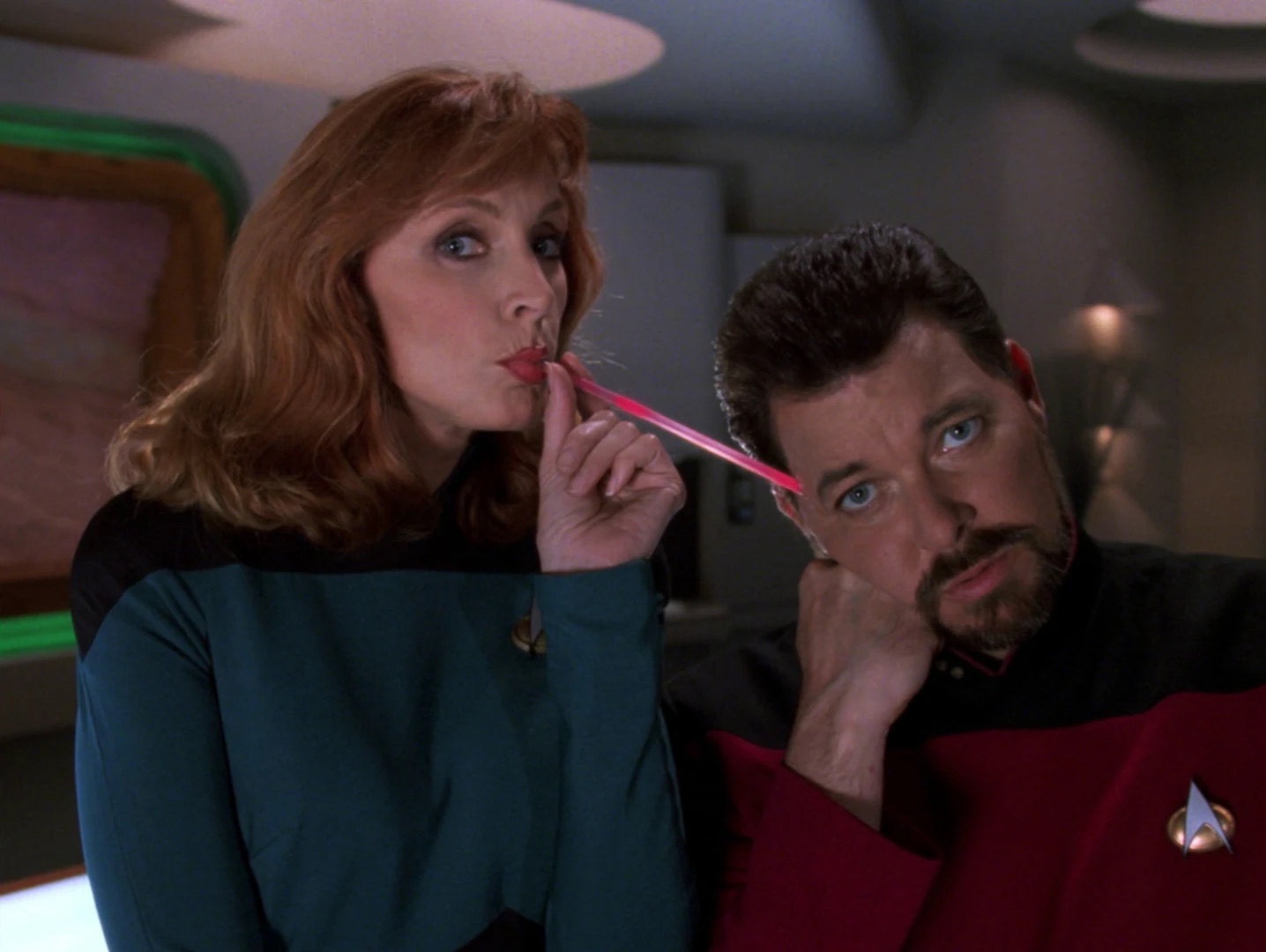I’m not sure how much I really have to say about “Phantasms.” It’s…fine. I mean, it’s not too hard to imagine what was going through Brannon Braga’s mind when he came up with the idea for this episode: “Well, we did an episode about Data dreaming, so…why not an episode about him having nightmares?” It’s certainly not as high-concept as many of his episodes, but I guess it does aim for the same sort of eerie unreality for which several of them are notable (“Frame of Mind,” say, or “Schisms,” or even—albeit much less successfully—”Identity Crisis”)…and it also exhibits his goofier side a bit. It has its charms, and parts of it are fun enough, but there’s really not much substance to it, and even the offbeat tone that it is clearly aiming for only feels sort of half-realized. I don’t have any big objections to “Phantasms,” but it doesn’t really do a lot for me, either.
As is often the case with Braga, one big thing that really feels missing to me is any meaningful connection to, or exploration of, character issues. So, okay, Data having nightmares? A fine idea. What should they be about? If the answer to this question had been something significant to Data, it could have made for a really compelling story. For instance, just a few episodes ago, Data fell under the malign influence of Lore, was fed a bunch of negative emotions, and almost murdered Geordi. That’ll give a (human) person nightmares, right? If the dream program is supposed to be a vehicle for furthering Data’s exploration of his pseudo-humanity, what if the writers had used the nightmare episode to suggest that the negative emotions fed to him by Lore were having lingering effects on him? This could have reintroduced the theme (briefly touched on in part one of “Descent,” but then dropped) about Data’s exploration of humanity having a dark side, and him trying to process that. Had “Phantasms” attempted something like this, it might have felt significant. Instead, though, the nightmares merely relate to a ho-hum random sci-fi jeopardy plot of the week. They’re still quirky and weird enough to hold a certain amount of interest, but they don’t amount to a story with any real depth or stakes. They don’t, in short, “mean anything.” When Troi quotes Sigmund Freud’s acknowledgement that “sometimes a cigar is just a cigar,” it’s almost like she’s commenting apologetically on the significance (or lack thereof) of the episode itself.
Then, too, the episode is padded out with various minor threads that are mildly interesting at best, but ultimately go nowhere. In terms of plot, too much of the episode revolves around random-feeling “Tech Trouble” (the least worthy of my 8 TNG “story types”). I suppose it’s to the episode’s credit that it doesn’t try to make the Enterprise‘s engine troubles a high-stakes “oh no!” type of plot, instead opting for some low-key humor by having their main consequence be that Picard is simultaneously saved from having to endure a dreaded social function but also made to look bad (i.e like he’s inventing problems in order to get out of going) in the eyes of an admiral. Still, to be frank—I’m just not that entertained by this running gag (and the admiral’s stern admonitions come across to me as a bit cartoonish, as though he’s deliberately trying to inflict social tedium upon the poor captain). Meanwhile, down in engineering, there is a young female ensign who has a crush on Geordi, which…is, um, a fact that’s true about this episode. It has no connection to anything else in the episode, and it goes nowhere, but, yep, it’s a thing that the episode spends a couple of scenes on. (Data’s offer to intervene that Geordi quickly nixes, and Geordi not getting around to addressing the situation himself, both seem like tidbits that might have led to a subplot, but absolutely nothing comes of them. Meanwhile, of course, there is again no effort to actually tell a substantive story that would connect to Gerordi’s long-term character arc, what with him being a guy who has frequently been on the other end of one-sided crushes and all.)
In short, despite whatever potential I might see in some of the story elements upon which it was built, “Phantasms” is at best a sugary confection rather than a hearty meal—a “cellular peptide cake,” indeed, as opposed to (say) a cellular peptide steak. It’s tasty enough, but it doesn’t really satisfy.

I’d never thought of the idea of linking nightmares to his emotions in Descent, but that is very obviously the answer here to turning a curiosity into something compelling. Trek was still limited in these days to more episodic stories, but this doesn’t seem too far out from stuff they’d already done.
I feel like this season might represent the show straining under the weight of Trek having explored through most of the obvious concepts that lend themselves to stories given the basic premise established in TOS and early TNG. This episode is a good example of the show not stepping past some of those limitations and creating new stuff to explore.